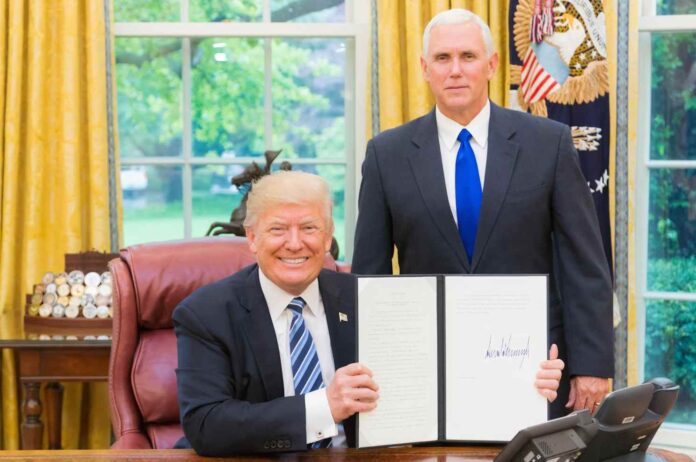- Trump introduced a $100,000 fee for new H-1B visa applications starting September 21, 2025.
- Experts warn it could harm U.S. innovation and push talent to other countries.
- Tech giants and universities may face major costs, while Indian workers could be priced out.
- Opinions in the industry are split, with some praising financial incentives and others warning of severe damage.
President Donald Trump has announced a dramatic change to the H-1B visa program that has long supported the U.S. technology sector. Over the weekend, the administration introduced a $100,000 fee for new H-1B visa applications filed by employers after September 21, 2025.
The decision shook Silicon Valley and beyond, where many companies depend on global talent to drive innovation.
Since the 1990s, the H-1B system has opened the door for hundreds of thousands of skilled workers to join American companies, especially in technology and engineering. Trump, however, argued that the program has been exploited, claiming that it has replaced U.S. workers instead of supplementing them.
Experts, universities, and industry leaders are voicing concerns that the steep new fee could discourage talent from entering the country. Many believe this could harm American competitiveness in fields like artificial intelligence, engineering, and computer science.
Experts Warn of Damage to U.S. Innovation
Economists have been quick to highlight the risks. Giovanni Peri, professor of economics at the University of California, Davis, said foreign STEM workers have historically fueled growth and job creation across the U.S. He stressed that evidence shows H-1B workers boost wealth and create more opportunities for Americans.
Subodha Kumar of Temple University’s Fox School of Business echoed those concerns. He pointed out that a large share of U.S. research and development relies on international experts. According to him, reducing access to that talent will directly harm innovation and slow progress in critical industries.
Madeline Zavodny, professor of economics at the University of North Florida, added that the new fee is not the right solution. Instead, she suggested that the U.S. should explore a national auction system that allows companies to bid for H-1B slots, while exempting nonprofits and universities. She believes such a model would be fairer and more sustainable.
The Tech Industry’s Heavy Reliance on H-1Bs
The U.S. government estimated in 2020 that more than half a million residents were on H-1B visas. A majority of them work in technology, with the Department of Homeland Security reporting that nearly two-thirds of new approvals in 2024 were for computer-related jobs.
Some of the biggest names in tech have directly benefited from this system. Microsoft CEO Satya Nadella, Google CEO Sundar Pichai, and Zoom founder Eric Yuan all came to the U.S. through H-1B visas. Beyond individuals, major companies such as Amazon, IBM, Microsoft, Google, and Meta have been among the top sponsors of visa workers. In 2024, Amazon alone employed almost 15,000 workers under the program.
Research has consistently shown a strong link between H-1B visas and innovation. A 2021 study found that states with more H-1B visa holders produced significantly higher numbers of patents, particularly in areas such as computer science and optoelectronics.
Divided Opinions Among Tech Leaders
Not all voices in the industry are united in opposition. OpenAI’s Sam Altman told CNBC that adding financial incentives may help streamline the process and ensure that the U.S. attracts the smartest people. Reed Hastings, chairman of Netflix, went further, calling the fee a “great solution” that could eliminate the need for a lottery system and reserve visas for high-value jobs.
Others, however, remain alarmed. Michael Intrator, CEO of Coreweave, described the fee as “sand in the gears” of business operations, warning that companies like his may struggle to secure talent at such costs.
Elon Musk himself has had a complicated stance. He acknowledged that H-1B visas enabled many critical contributors to build companies like SpaceX and Tesla. Yet in the past, Musk has also described the visa system as broken, supporting reform but not in the form of extreme costs.
Global and Academic Impacts Loom Large
The impact may be especially severe for Indian workers, who represent nearly 70 percent of H-1B visa holders. Critics believe the steep fee could shut many of them out, forcing talented engineers to seek opportunities in countries like the U.K. or Canada. Some Indian entrepreneurs suggest this could fuel a new wave of startups back in India, with globally trained engineers building for international markets.
For universities and nonprofits, the fee could be devastating. While these institutions are typically exempt from annual visa caps, they still depend on H-1B sponsorship. Harvard University, for example, sponsors about 125 new H-1B petitions each year. Under the new rule, this would mean more than $10 million in annual costs, an amount that even elite institutions would find hard to sustain.
Peri warned that this move could weaken America’s research leadership. Many groundbreaking scientific advances in the U.S. are driven by academics and nonprofit researchers on H-1B visas. Cutting off their pipeline may shift the balance of global innovation away from the U.S.
The Bigger Picture of Jobs and Policy
Trump’s stated goal is to protect American workers. Some argue that in the long run, this policy could push companies to invest more in training the domestic workforce. Kumar noted that such a shift could eventually strengthen U.S. talent pipelines, but he cautioned that building this infrastructure will take years. In the short term, he predicted confusion and setbacks for companies trying to fill urgent roles.
The debate reflects deeper divisions within the administration. Business leaders and tech executives recognize the risks of pushing away foreign talent. At the same time, immigration hardliners remain focused on limiting entry, regardless of the economic consequences.
Follow TechBSB For More Updates

